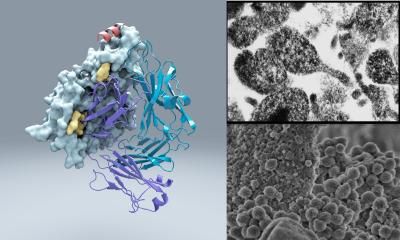Compound identified that protects against neurodegeneration
Researchers from the University of Liverpool have identified a new compound that protects against neurodegeneration in nematode worms. The discovery may enable novel treatments for human neurodegenerative diseases to be developed in the future.
With the predicted growth of the global ageing population, cases of age-associated neurodegenerative diseases such as Alzheimer's disease, Parkinson's disease and amyotrophic lateral sclerosis (ALS) are expected to rise. However, most current therapies do not decelerate or modify disease, and efforts to develop new treatments have been met with high attrition rates.
The antiepileptic drug ethosuximide has recently been shown to protect against neurodegeneration in various nematode worm and rodent models. It is therefore a promising repurposing candidate for the treatment of multiple neurodegenerative diseases. However, high concentrations of the drug are required for its protective effects in animal models, which may limit its translational potential and impede the identification of its molecular mechanism of action.
100 times more potent
Researchers, led by Professor Alan Morgan from the University's Institute of Translational Medicine, aimed to develop a more potent version of the drug to avoid these impediments.
In a collaborative approach involving University of Liverpool experts in Chemistry, (Professor Paul O'Neill, Dr Neil Berry), Nuclear magnetic resonance (Dr Marie Phelan) and nematode worms (Dr Shi Quan Wong, Professor Bob Burgoyne, Dr Jeff Barclay) the team identified a novel neuroprotective molecule called MPS that is chemically similar to ethosuximide, but is much more potent in reducing neurodegeneration in a worm model of ALS.
Professor Morgan, said: "Our research has revealed a novel neuroprotective activity of MPS that is over 100 times more potent than ethosuximide. This discovery may have translational potential for the treatment of ALS and potentially other neurodegenerative diseases."
Original publication
Shi Quan Wong and Matthew G. Pontifex and Marie M. Phelan and Chandra Pidathala and Brian C. Kraemer and Jeff W. Barclay and Neil G. Berry and Paul M. O'Neill and Robert D. Burgoyne and Alan Morgan; "α-Methyl-α-phenylsuccinimide ameliorates neurodegeneration in a C. elegans model of TDP-43 proteinopathy"; Neurobiology of Diseases; 2018
Most read news
Original publication
Shi Quan Wong and Matthew G. Pontifex and Marie M. Phelan and Chandra Pidathala and Brian C. Kraemer and Jeff W. Barclay and Neil G. Berry and Paul M. O'Neill and Robert D. Burgoyne and Alan Morgan; "α-Methyl-α-phenylsuccinimide ameliorates neurodegeneration in a C. elegans model of TDP-43 proteinopathy"; Neurobiology of Diseases; 2018
Topics
Organizations
Other news from the department science

Get the life science industry in your inbox
By submitting this form you agree that LUMITOS AG will send you the newsletter(s) selected above by email. Your data will not be passed on to third parties. Your data will be stored and processed in accordance with our data protection regulations. LUMITOS may contact you by email for the purpose of advertising or market and opinion surveys. You can revoke your consent at any time without giving reasons to LUMITOS AG, Ernst-Augustin-Str. 2, 12489 Berlin, Germany or by e-mail at revoke@lumitos.com with effect for the future. In addition, each email contains a link to unsubscribe from the corresponding newsletter.
Most read news
More news from our other portals
Last viewed contents
Stem cells help researchers peg rabies resistance
Charley_horse
DxS Appoints David Jackson as Vice President of Business Development and Licensing
Melinda_Gates
SYGNIS strengthens IP position in the treatment of acute stroke with AX200 in the US
Merck Decides Not to Pursue Evofosfamide Further in Soft Tissue Sarcoma and Pancreatic Cancer
Researchers optimizing progesterone for brain injury treatment - New approaches include adding vitamin D and using water-soluble analogues

The ultimate decoy - Scientists find protein that helps bacteria misdirect immune system
Researchers rapidly turn bacteria into biotech factories
PBL InterferonSource founder, Sidney Pestka, MD, to receive 'Distinguished Service Award' from 'ISICR'
Fabry's_disease






















































